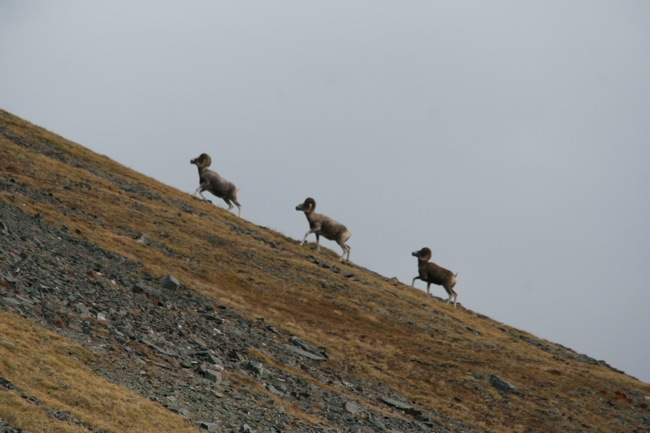Biologists from the US and Spain Count Sheep in Altai [2011]
“I have never experienced mountains like these.”
In August 2011, The Altai Project sent a team of two wildlife ecologists and three graduate students from the US to Altai to join an international survey of argali mountain sheep. There they met a colleague from Spain and two from Russia with whom they trekked along the rugged ridges of the Russia-Mongolia border, seeking ungulates among some of the most remote mountains in the world.
 Ultimately they identified over 600 argali, over one third of the total number of animals suspected to remain in Russia. While the Altai Project group surveyed argali in Russia this summer, other teams were surveying the animals in neighboring Mongolia and Kazakhstan. This will produce a global population estimate for the endangered argali (Ovis ammon ammon), the world’s largest wild sheep. Argali are an important prey species for the snow leopard, a large mountain cat that is also highly endangered.
Ultimately they identified over 600 argali, over one third of the total number of animals suspected to remain in Russia. While the Altai Project group surveyed argali in Russia this summer, other teams were surveying the animals in neighboring Mongolia and Kazakhstan. This will produce a global population estimate for the endangered argali (Ovis ammon ammon), the world’s largest wild sheep. Argali are an important prey species for the snow leopard, a large mountain cat that is also highly endangered.
Altaisky State Biosphere Reserve biologist told the group, “Having foreigners involved in the survey effort helps bring legitimacy to the cause of argali conservation.” Despite their protected status, argali are frequently hunted for their meat and large corkscrew horns, which are used in Chinese medicine. Even government officials have been accused of poaching argali, notably when one such attempt in 2009 ended in a fatal helicopter crash.
Looking ahead, Jennifer Castner, TAP’s director, says, “Tracking the population dynamics of key species like the argali is vital to understanding their role in snow leopard habitat, competition with free-roaming livestock, and assessing the results of our anti-poaching and other enforcement efforts.”
James Gibbs, SUNY-ESF professor who has made numerous trips to Altai, began planning this trip a year ago. Jennifer Castner of The Altai Project secured funding from the Trust for Mutual Understanding. Jacqui Frair (Assistant Professor, SUNY-ESF), Jim Arrigoni (Ph.D. candidate, SUNY-ESF), Elizabeth Hunter (M.Sc. candidate, SUNY-ESF), and Meredith Atwood (Ph.D. student, Yale University) participated from the US and mammalogist Javier Zabala of IHOBE, Bilbao, Spain met the group in Russia.
“Poaching has become a large problem for argali survival as their huge horns make them a much desired target for trophy hunters,” Hunter commented. “We hope that our efforts help to protect the argali population in Russia and promote conservation efforts in Altai.”
The American members of the group were deeply moved by the spectacular terrain the argali inhabit, now threatened by Gazprom’s plans to build a natural gas pipeline through Altai. “The complete lack of trees, the sweeping views, and the crystal clear air resulted in a sense of total openness,” Arrigoni reported. “There were no trails, and most days … I did not see any other person.”
“My life in the States feels different now than it did before I left,” says Atwood. “I long for the community we built together, the rare glimpses of the majestic argali, and the spectacular hiking. Back at home, it’s rare to feel that connected to nature.
“The Altai is remote and raw, beautiful and vast, breath-taking and inspiring. It is a place most worthy of protection, of research, and, perhaps most of all, of our respect.”
Thanks to WWF-Altai-Sayan for technical and logistical support and expertise.
Learn More!
- See pictures from the expedition
- Learn about snow leopards who depend on argali for their survival
- Read about TAP’s work to stop poaching using new technology in this region
